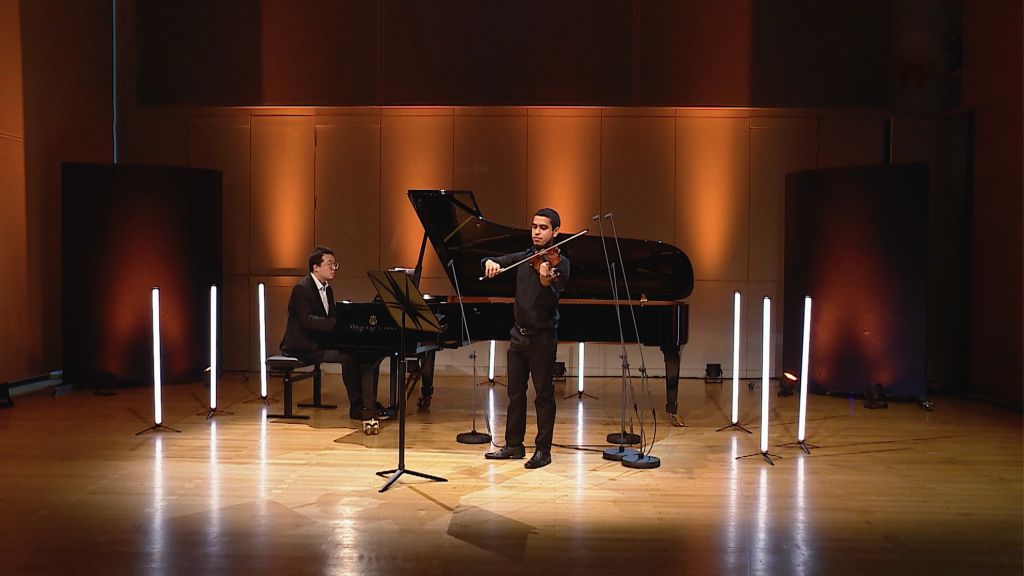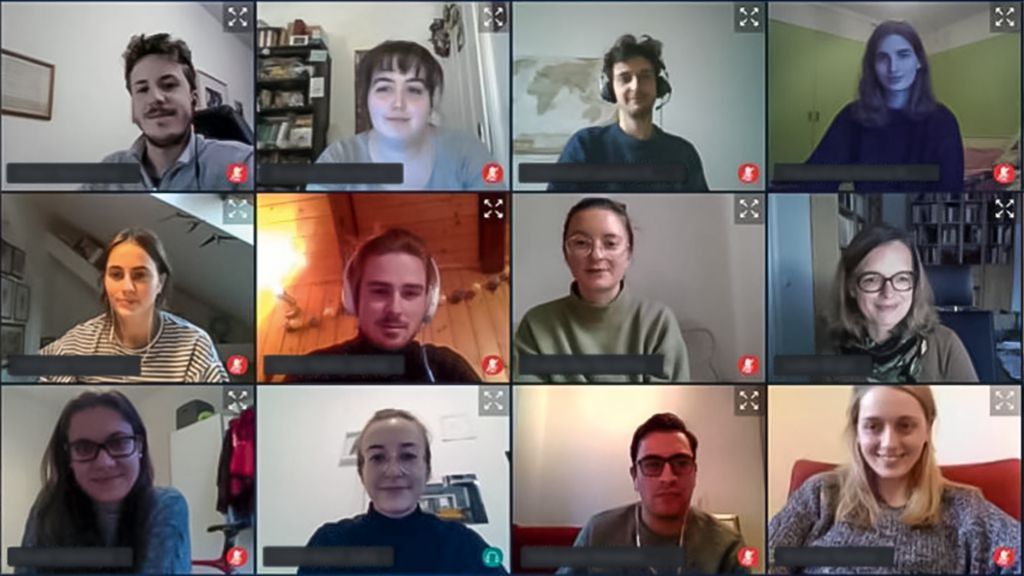An Inter-University Beethoven Year Project
2020’s Beethoven jubilee inspired a great number of cultural events and musicological research projects in many places—especially in Vienna. And to conclude this special year here, the 2020/21 winter semester saw 18 students from the University of Vienna’s Department of Musicology (led by Birgit Lodes as part of the course “Beethovens Violinsonaten – Entstehung, Analyse, Interpretation” [Beethoven’s Violin Sonatas – Genesis, Analysis, Interpretation]) join forces for an inter-university project with 15 performers from the mdw led by Elisabeth Kropfitsch. A similar collaborative project had already taken place at the year’s outset in connection with a concert lecture on Beethoven’s piano compositions and their dedications.

As planning for the December project got underway, one thing was clear: this concert lecture was to revolve around Beethoven’s sonatas for piano with violin accompaniment (now commonly referred to as “violin sonatas”). Following extensive research, a golden thread and title for the approaching coproduction materialised: Wissenschaft trifft Kunst. Beethoven à la française? Die Violinsonaten im Kontext. [Research Meets Art. Beethoven à la française? The Violin Sonatas in Context.] The overall concept of the project was aimed at demonstrating the significance of Beethoven’s contributions to the genre as well as the innovative way in which he broke through existing traditions. In doing so, uniting informative moderation with concert performances was not the only challenge—for the event ultimately had to be transferred to the virtual realm due to the COVID-19 pandemic’s turn for the worse. It was in this context that on Friday, 18 December 2020, a stream was put out with material that had been pre-recorded in various locations.
While the associated course had initially been held in person, the situation with COVID-19 soon forced everything to take place in digital form. This pitted the participants against new challenges but simultaneously opened up opportunities to convey and contextualise the programme’s content in innovative ways. Following musicological preparation of the programme itself, the respective moderated segments had to be packaged as short videos. The object was hence not only to arrive at suitable texts but also to find the right video and audio quality as well as appropriate lighting, camera angles, gestures, and similar. And following multiple rounds of internal feedback, the students were fortunate enough to additionally profit from the know-how of Ö1 moderator Nadja Kayali, who contributed valuable suggestions concerning the quality of these moderation clips—which were ultimately “filmed” in home office settings.
At the same time, the violinists and pianists from the various instrumental studies classes rehearsed the selected programme—initially together with their professors via Zoom, then (luckily!) on-site and in their intended pairings during the final phase. It was ultimately possible to film aesthetically pleasing videos at the mdw subject to the observation of all hygiene measures. Cordial thanks go out to Ulrich Wagner (of the mdw’s AV-Centre) and his team for their professional recordings and to the mdw’s Event Management staff as well as this project’s patron, Vice Rector Johannes Meissl, for their active support in these truly complicated times!
A specially produced website serves as an innovative complimentary medium: alongside a link to the stream, the content made available there invites the audience to investigate the thematic complex tackled by this project in greater depth. The site contains brief biographies of the performing artists with statements on the repertoire they played as well as video interviews in which some of them discuss their personal perspectives on these works. A timeline provides an overview of Beethoven’s piano and violin works’ temporal positioning while further videos deal with topics including aspects of the French violin-playing tradition.

A further narrative in this programme is the so-called “new way”, as which Beethoven himself once described his abandonment of old composing traditions. The transformation of this programme’s chosen genre from sonatas for piano with violin accompaniment to an equal dialogue between the two instruments is reflected in the performed repertoire. The concert then concludes with the last movement of the well-known Kreuzer Sonata (which Beethoven had originally composed as the final movement of his Sonata op. 30 no. 1), which brings the programme full circle—once again highlighting the connection to Rodolphe Kreutzer and the French violin school.
The success of this collaboration between two institutions, the mdw and the University of Vienna, makes clear the mutual enrichment of art and research that buoyed all of the participants beyond the confines of this project, even before the backdrop of the ongoing pandemic. And the resulting concert lecture, recorded in various locations on Beethoven’s 250th birthday, pays audible and visible homage to those works for piano and violin that allow one to grasp Beethoven in dialogue with the performers of his day but are so seldom heard in present-day concert life. Do give them a listen!
Further Information: musikwissenschaft.univie.ac.at/ueber-uns/team/lodes/gespraechskonzert
Watch and listen online at the mdwMediathek: mediathek.mdw.ac.at/gespraechskonzert_beethoven

